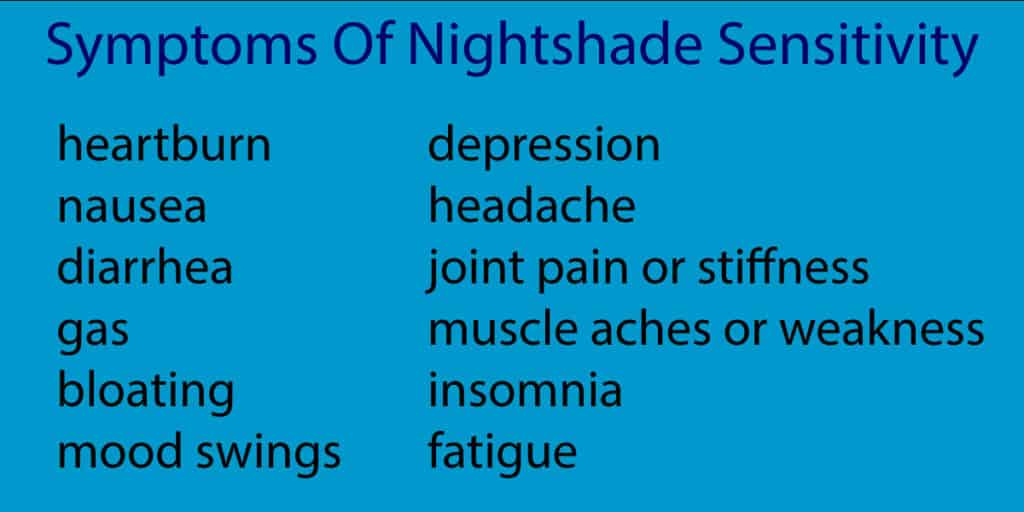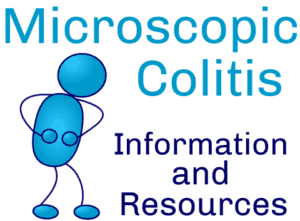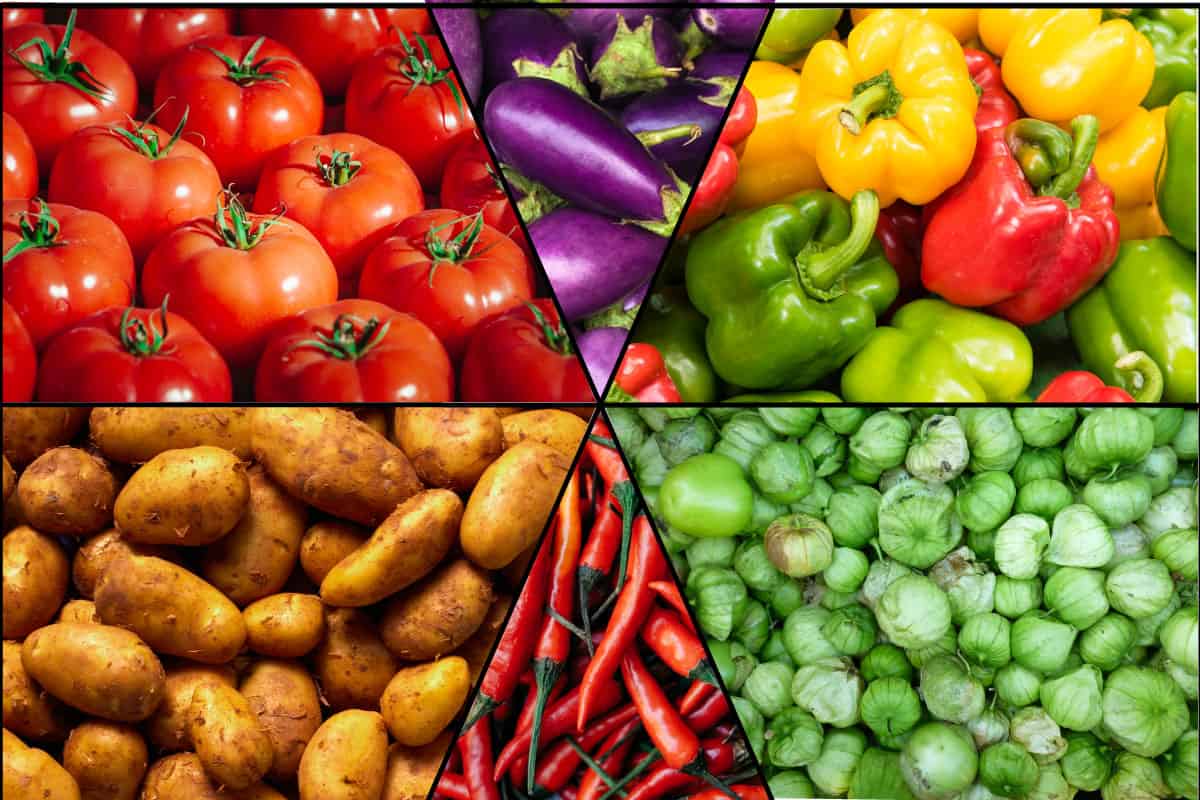When I was diagnosed with collagenous colitis, one of the first things I researched was diet change to try to get my symptoms under control. As I was looking through advice on what to eat and what to avoid, I kept coming across advice to avoid Nightshades. “Nightshades,” I thought to myself. “Like Deadly Nightshade? Who the heck would eat those?” The answer is most of us.
Nightshades (Solanaceae) are a family of over 2,000 flowering plants, several of which are toxic to humans. Nightshade vegetables are the edible parts of some of these plants. The most common nightshade vegetables are tomatoes, potatoes, peppers, and eggplant. Another common nightshade used by humans, although not eaten, is tobacco. While generally healthy foods, nightshades are thought to cause inflammation in certain groups of people, including those with microscopic colitis. Let’s dig a little deeper into this.
Common Nightshades
Nightshades are a staple in most people’s diets throughout the world. They are nutrient-dense, healthy foods. I’ve tried assembled as complete a list as possible of nightshade vegetables and other common sources of nightshades for you.
| Ashwagandha | Other (possible) sources: |
| Bell peppers (all colors) | Paprika |
| Bush tomato | Chili pepper flakes |
| Cape gooseberry (a.k.a ground cherries) | Chili powder |
| Cocona | Chinese Five-Spice powder |
| Eggplant | Curry powder |
| Garden huckleberry (not regular huckleberries) | Garam masala |
| Goji berries | Hot sauce |
| Hot peppers (jalapenos, chili peppers, etc) | Ketchup |
| Kutjera | BBQ sauce |
| Naranjillas | Most spice blends |
| Pepinos (a.k.a. melon pear) | Steak seasoning |
| Pimentos | Vegetable broths |
| Potatoes (not sweet potatoes) | Tobacco |
| Tamarillos | |
| Tomatillos | |
| Tomatoes |
Sweet potatoes, yams, zucchini, and black pepper are NOT nightshades.
Please be aware that each food listed includes all varieties of that food. For example, bell peppers includes red, green, yellow, and orange. Potato includes white, red, etc.
Also, some of these are a little less common, but you might encounter them if you travel, and some are used in supplements, so I wanted you to be familiar with them.
Nightshades Are Healthy
Nightshade vegetables are loaded with important vitamins and minerals, and can play a huge role in a healthy diet. You can get a lot of nutrients from nightshades without packing on a lot of calories. This is why many healthcare professionals recommend you eat nightshade vegetables.
Let’s go into more detail on the most common nightshade vegetables.
Tomatoes
Tomatoes are a good source of vitamin C (necessary for the growth and repair of all body tissues), vitamin A (immunity, skin health, vision), vitamin K (bone health), folate (needed to make red and white blood cells) and potassium (blood pressure and heart function). Tomatoes also contain the antioxidant lycopene, which has been tied to lower risk of heart attack, diabetes, stroke, and some cancers (1). They also contain the nutrients lutein and beta-carotene, which help protect vision.
Potatoes
Potatoes (with the skin on) are a rich source of several vitamins and minerals including vitamins C, B6 (metabolism), potassium, manganese (nervous system function), magnesium (helps regulate biochemical reactions in the body), phosphorus (bone and teeth formation), niacin (convert food into energy), and folate. Potatoes are also a good source of fiber. In addition, they contain flavonoids, carotenoids and phenolic acids, all of which act as antioxidants in the body. Antioxidants help remove free radicals from the body, which can reduce the risk of heart disease, cancer, and diabetes (2).
Bell Peppers
A single bell pepper can provide over 150% of a person’s recommended daily intake of vitamin C. They are also good sources of vitamin K1, vitamin E (an antioxident), vitamin A (vision and immunity), folate, and potassium. In addition, bell peppers contain many antioxidants including capsanthin, luteolin , quercetin, violaxanthin, and lutein.
Eggplant
Eggplants are a good high fiber, low calorie food. One cup of raw eggplant only contains 20 calories. They are a good source of manganese, folate, potassium, vitamin K, and vitamin C. They also contain a high number of antioxidants, especially anthocyanins , which are what give eggplants such amazing color.
Chili peppers
Chili peppers, such as jalapeño and cayenne, are also high in vitamins and minerals, but they are usually eaten in small amounts so they don’t really contribute much to your daily vitamin and mineral intake. However, they do pack a punch in the antioxidant department. The most notable is capsaicin, which is what gives chili peppers their heat. Red (mature) chili peppers have higher levels of antioxidants than green (immature) (3).
So Why Avoid Them?
Now that I’ve gone on and on about how nightshades are good for your health, you’re probably wondering why anyone would want to avoid eating them.
The answer is MOST people shouldn’t eliminate them. However, if you have an autoimmune disease (a condition where the body’s immune system attacks normal tissue), you might want to consider eliminating nightshades from your diet to see if you have an improvement in symptoms.
This is especially true if you have an inflammatory bowel disease (IBD) such as microscopic colitis (MC), Crohn’s disease, or ulcerative colitis (UC). Inflammatory bowel diseases are autoimmune diseases characterized by inflammation of the digestive track.
In IBD, protective lining of the intestine is damaged, and this allows food, bacteria, and toxins to enter the bloodstream. This is sometimes called “leaky gut.” (4)
When this happens, it triggers the body’s immune system to attack the harmful substances. This can lead to more inflammation and damage to the intestines.
Nightshade vegetables contain several compounds that might aggravate this cycle of inflammation and damage. All nighshade plants contain alkaloids which work as a natural insect repellent by disrupting the attacker’s cell membranes. These can also have a negative affect on people.
- Glycoalkaloids – have been shown in studies to contribute to IBD and leaky gut. (5) They can also block certain enzymes needed to regulate nerve impulses, resulting in an overstimulated nervous system. (6)
- Saponins – can create holes in cell membranes and interfere with cellular function (7) and can increase leaky gut (8).
- Nicotine – tobacco is a member of the nightshade family. Nightshade vegetables also contain nicotine, which might make them slightly addictive. Nicotine is also inflammatory and has been shown to impede wound healing (9).
- Calcitriol – can result in calcium deposits in the soft tissues of the body. Some believe that this may play a role in osteoarthritis and coronary artery disease.
The symptoms of nightshade sensitivity vary from person to person, but the most common are shown below:

Eliminating Nightshades
If you have an autoimmune disease, or think you might be sensitive to nightshades, you might want to try eliminating them from your diet to see if doing so changes any of your symptoms.
If you decide to do this, eliminate all nightshades from your diet for four to six weeks. Keep track of all of your symptoms during this time. Do not make any other changes to your diet or lifestyle during this time. In other words, don’t change your exercise routine or eliminate another food group. If you make any other changes while eliminating nightshades and you experience symptom relief, you won’t know what is causing the relief.
After the four to six week time frame, slowly start reintroducing nightshades into your diet. I recommend doing so one vegetable at a time because you might be fine with tomatoes, for instance, but have a reaction to bell peppers. Start with small amounts and gradually increase portions over the course of a few days. Keep track of your symptoms.
If you had symptom relief during the elimination period, but start to get worse during reintroduction, you might want to consider eliminating nightshades long term.
If there were no differences between the elimination period and the reintroduction period, then there is no reason to avoid nightshades. Keep them as a part of your healthy diet.
Watch For Hidden Nightshade
During the elimination period, keep an eye out for hidden nightshades. You’re going to have to become a label reader. If the label has the generic ingredient “spices,” you should probably assume it has nightshades, especially if there is any sort of “heat” to the product.
Potato starch – It is often used in gluten-free bread, pizza crust, crackers, and baked goods. It can also be used as a thickener in some soups and other products.
Peppers and Spices – most Mexican food, spice blends, sausage, hot dogs, lunch meat such as salami and pepperoni, sauces, marinades, etc.
Tomato – Vegetable broths, juices, seasonings.
Healthy Substitutes
If you decide to eliminate nightshades from your diet, you will be missing out on the nutrients they provide. However, there are plenty of other foods to choose from that provide many of the same nutrients and health benefits.
Here are a few changes you can make to eat healthy and still avoid nightshades:
- sweet potatoes: Sweet potatoes provide much more vitamin A than white potatoes.
- citrus fruits: Citrus fruits like oranges and grapefruit are high in vitamin C, as are many nightshade vegetables.
- dark leafy greens: Leafy green vegetables like spinach and kale are great sources of many the vitamins, minerals and dietary fiber you will be losing from eliminating nightshades.
If you still want to eat nightshades but want to reduce the alkaloid content, you can peel your potatoes, eat fully mature (ripe) tomatoes and peppers, and fully cook your nightshade vegetables.
Recipe Substitutes
If you’re like me, almost everything you eat has a nightshade in it. I live in Texas after all – salsa, chili powder, pico, TexMex. I didn’t know what to cook. Trying to plan my weekly shopping list was a nightmare.
Full confession, I’m not the world’s most creative cook. So, I took to the internet to find some substitutes for my staples.
Substitutes For Potato
- sweet potatoes
- jicama
- plantain
- rutabaga
- turnips
- cauliflower (mashed)
Substitutes For Tomato
I honestly couldn’t find a simple single item replacement for raw tomatoes. Most recipes I saw had combinations of vegetables. However, I did manage to find some ideas for replacing tomato paste, or when tomatoes are used in recipes to add some sweet/tartness.
- Pumpkin puree, butternut squash puree, or sweet potato puree. Unspiced versions
- Molasses
- Peanut butter (weird but works in certain recipes)
- Under-ripe mango or plum
- Zucchini with a little lemon juice (chopped in salad)
- Tamarind concentrate
- Umeboshi (tart plum) paste
There is also a company, Nomato, who makes a line of nightshade free sauces.
Substitutes For Spices
- Black Pepper
- Cumin
- Turmeric
There are a lot of brilliant cooks out there coming up with ways to cook without nightshades. In future articles, I might explore some of these recipes.
Conclusion
Nightshades are a healthy staple of many diets around the world, and most people should include them as a regular part of their diets.
People with autoimmune and other inflammatory diseases such as microscopic colitis, Crohn’s, arthritis, Hashimoto’s, and lupus often have sensitivity issues with foods. If you have eliminated the biggest offenders – gluten, dairy, soy – and are still experiencing symptoms of inflammation, you might want to try eliminating nightshades from your diet and see if you experience relief.
Good Luck!
- Microscopic Colitis FAQs
- Can CBD Help Treat Microscopic Colitis Symptoms?
- Reducing Stress May Ease Your Microscopic Colitis Symptoms
- What The Heck Are Nightshades And Why Would You Want To Avoid Them?
- Microscopic Colitis: Who Is At Risk For Developing It?
Recent Posts
When I diagnosed with microscopic colitis, I had a TON of questions. Honestly, I still do, and I'm still learning about this disease every day. I know I can't answer every possible question here, but...
After being diagnosed with microscopic colitis (MC), my gastroenterologist prescribed the usual drug regimens. Some had zero effect. Others worked while I was taking the medication, but if I stopped,...

